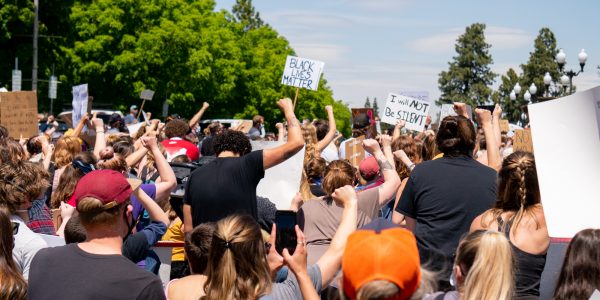We cannot be silent.

Silence is violence. This chant really resonated with us during yesterday’s protest in downtown Bend.
Like many, we are activated in this moment. From the pandemic’s greater impact on Native, Latinx and Black Americans, to the murder of George Floyd, Ahmaud Arbery, Breonna Taylor, and countless other people of color, these last few months have laid bare the deep inequities and racism in our nation. Pain, rage, sorrow and fear – we feel it all, and we’re compelled to act.
The Environmental Center must contribute to durable solutions for a more just tomorrow. We must use our platform – social media, events, and partnerships – to hold space for important conversations around racism and equity, and to amplify voices that need to be heard louder than ours. We must ensure that the emotions we feel and things we say right now are not fleeting or performative. We must hold ourselves accountable and play an active role in anti-racism over the long-term.
It’s not lost on us that environmental injustices are killing people of color across the nation – yet another trauma that the Black community has borne for too long. We know that The Environmental Center cannot by itself reverse America’s painful history of racial injustice. We will work alongside others to achieve radical transformation that is long overdue.
We all have a sphere of influence, and we will be intentional with ours. It is not enough to say “we hear you” when Black people rise up against structural racism. We will listen to understand, offer support, and be a megaphone.
Silence is violence.
For non-black people of color and white allies, this is a time to commit to unlearning. Over the next few weeks, we will share resources (on our social media pages) that are helping our team with this process. Here are a few ways you can take action right now.
Sign petitions.
-
Text FLOYD to 55156 to sign a petition from Color of Change
-
Text JUSTICE to 668366 to sign a petition from MoveOn
Make a donation.
Take actions.
-
The Movement for Black Lives Week of Action
-
Call/send letters to your representatives (Who represents me in Oregon?)
Photo credit: Julianna Jimreivat, Bend Against Policy Brutality Protest on 6/2/20